


Coming to Our Senses
Luke 15: 11-
O Holy One,
we are an impetuous lot,
demanding that our every whim be catered to,
and allowing desire to lead us down the path of indignity.
We walk upon Earth as the prodigal species,
taking the inheritance of a fourteen-
and a five-
and squandering it in dissolute living.
Now, O Source of All Inheritance,
we come to our senses.
Now, O Compassionate One,
we see the error of our ways.
Now, O Forgiver of Foolishness,
we seek to make amends.
Awaken us to a wonder that issues in humility
and drops us to our knees.
Transform our desire into a burning willingness
to reconcile ourselves one with another,
to heal our relationship to other species,
to see life as pure gift,
and to return with an offering of humility
to your awaiting arms.
Amen.
from If Darwin Prayed, by Bruce Sanguin
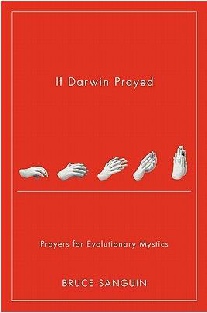

In Laudato 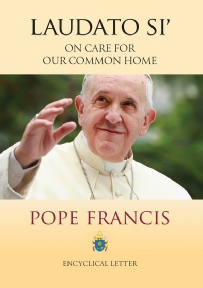 Si', Pope Francis holds up St. Francis as a model for us in loving all Creation, pointing out that 'if we feel intimately united with all that exists, then sobriety and care will well up spontaneously' in us:
Si', Pope Francis holds up St. Francis as a model for us in loving all Creation, pointing out that 'if we feel intimately united with all that exists, then sobriety and care will well up spontaneously' in us:
10. . . . I believe that Saint Francis is the example par excellence of care for the vulnerable and of an integral ecology lived out joyfully and authentically. He is the patron saint of all who study and work in the area of ecology, and he is also much loved by non-
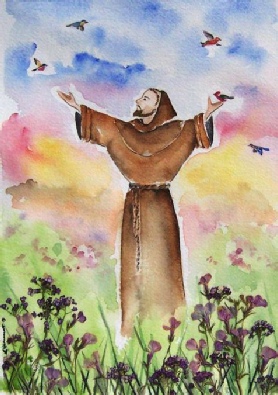
11. Francis helps us to see that an integral ecology calls for openness to categories which transcend the language of mathematics and biology, and take us to the heart of what it is to be human. Just as happens when we fall in love with someone, whenever he would gaze at the sun, the moon or the smallest of animals, he burst into song, drawing all other creatures into his praise. He communed with all creation, even preaching to the flowers, inviting them “to praise the Lord, just as if they were endowed with reason”. His response to the world around him was so much more than intellectual appreciation or economic calculus, for to him each and every creature was a sister united to him by bonds of affection. That is why he felt called to care for all that exists. His disciple Saint Bonaventure tells us that, “from a reflection on the primary source of all things, filled with even more abundant piety, he would call creatures, no matter how small, by the name of ‘brother’ or ‘sister’”. Such a conviction cannot be written off as naive romanticism, for it affects the choices which determine our behaviour. If we approach nature and the environment without this openness to awe and wonder, if we no longer speak the language of fraternity and beauty in our relationship with the world, our attitude will be that of masters, consumers, ruthless exploiters, unable to set limits on their immediate needs. By contrast, if we feel intimately united with all that exists, then sobriety and care will well up spontaneously. The poverty and austerity of Saint Francis were no mere veneer of asceticism, but something much more radical: a refusal to turn reality into an object simply to be used and controlled.
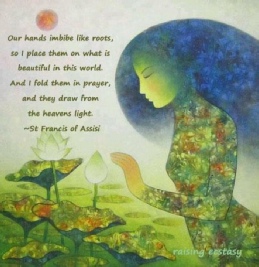
12. What is more, Saint Francis, faithful to Scripture, invites us to see nature as a magnificent book in which God speaks to us and grants us a glimpse of his infinite beauty and goodness. “Through the greatness and the beauty of creatures one comes to know by analogy their maker” (Wis 13:5); indeed, “his eternal power and divinity have been made known through his works since the creation of the world” (Rom 1:20). For this reason, Francis asked that part of the friary garden always be left untouched, so that wild flowers and herbs could grow there, and those who saw them could raise their minds to God, the Creator of such beauty. Rather than a problem to be solved, the world is a joyful mystery to be contemplated with gladness and praise.




Recommended Resources
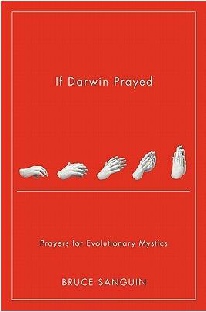
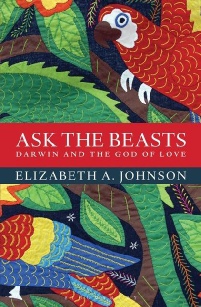


Two Books:
‘If Darwin Prayed’ by Bruce Sanguin
‘Ask the Beasts’ by Elizabeth Johnson

A number of Talks on this subject are available on YouTube,
e.g. “Is God’s love broad enough for bears?’
Clicking on the image below will bring you to the YouTube video
One or Two Things (Excerpt)
The god of dirt
came up to me many times and said
so many wise and delectable things, I lay
on the grass listening
to his dog voice,
crow voice,
frog voice; now,
he said, and now,
and never once mentioned forever
~ Mary Oliver ~
(Dream Work)

Also the TED Talks
e.g. Protecting our Oceans by Sylvia Earle and many other ecology issues
Clicking on the image below will bring you to Sylvie Earle’s Ted Talk
